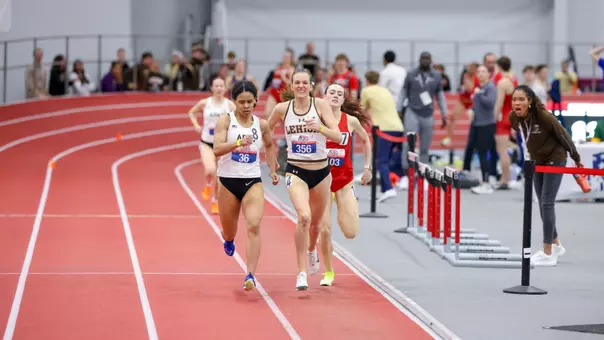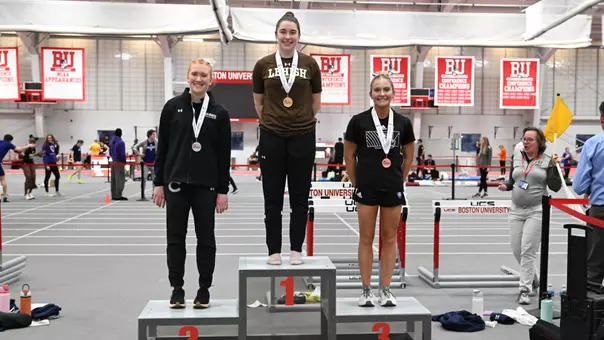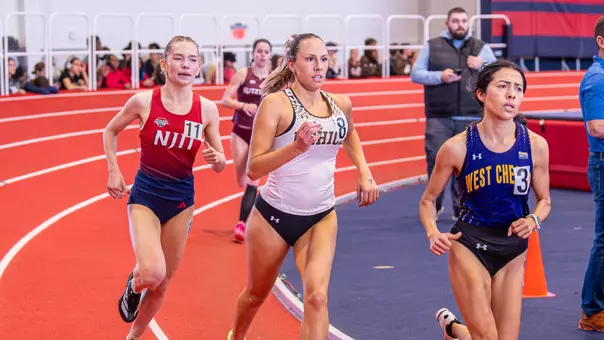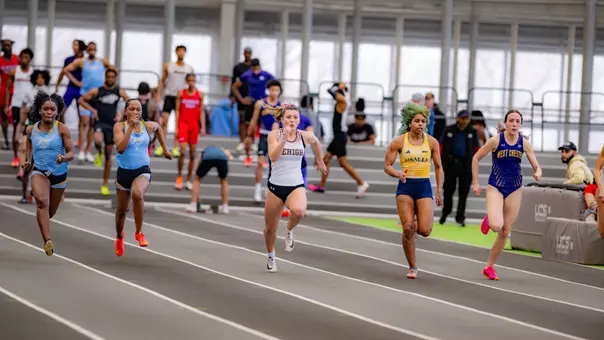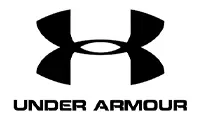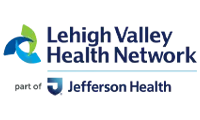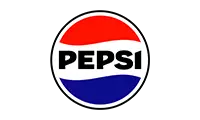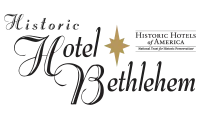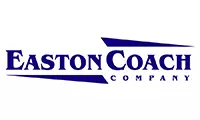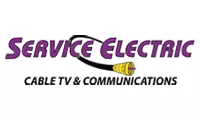Lehigh University Athletics
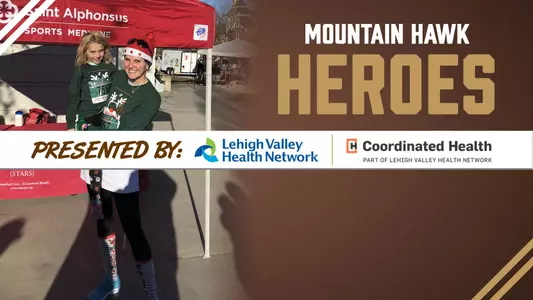
Mountain Hawk Heroes: Track and Field Alum Jenny Warner Southard
10/7/2020 12:22:00 PM | Women's Track and Field, Support, Features, Flight 45, Intellectual Development
Every Wednesday, Lehigh Athletics, Lehigh Valley Health Network and Coordinated Health is proud to recognize a Mountain Hawk Hero - someone associated with Lehigh Athletics who is making a difference in the medical field. We continue today with track and field alum Jenny Warner Southard '03.
Previous Mountain Hawk Heroes
September 30: Taylor Wise (Swimming and Diving Alum)
September 23: Matt Christman (Track and Field Alum)
September 16: Steph Fratoni (Field Hockey Alum)
September 9: Mike Price (Swimming and Diving Alum)
September 2: Yasmin Deliz (Track and Field Alum)
August 26: Evan Guerrero (Men's Lacrosse Alum)
August 19: Ross Biggs (Baseball Alum)
August 12: Cynthia Izuno Macri (Soccer Alum)
August 5: Susan Westman (Rowing Student-Athlete)
July 29: Megan Hetzel (Track and Field/Cross Country Alum)
July 22: Lexi Martins (Women's Basketball Alum)
July 15: Nii Daako-Darko (Track and Field/Cross Country Alum)
July 8: Ali Linsk Butash (Softball Alum)
July 1: Kimberly Scotto-Wetzel & Jonathan Wetzel (Track and Field/Cross Country Alums)
June 24: Robert Bonow (Men's Basketball Alum)
June 17: Morgan Decker (Softball Alum)
June 10: Jim Guzzo (Former Quarterback)
June 3: Amina Affini (Women's Basketball Alum)
May 27: Natalie Krane (Women's Soccer Alum)
May 20: Tricia Klein (Women's Golf Assistant Coach)
By: Justin Lafleur, Lehigh Sports Communications
Former Lehigh track and field student-athlete Jenny (Warner) Southard turned a negative (an injury) into a positive (a fulfilling career in medicine).
"During my third year at Lehigh, I tore my meniscus jumping, so I spent a lot of time in the athletic training room, along with seeing the orthopedic surgeon," said the former pentathlon and heptathlon athlete. "During my first three years at Lehigh, I did biochemical engineering and thought I would work in pharmaceuticals or materials science and engineering.
"But being in the training room I became interested in medicine."
Flash forward nearly two decades and that interest has led to a career in both family medicine (as a primary care doctor) and sports medicine.
"I currently live in Boise, Idaho and do a hybrid of both," said Southard. "I work three days a week and get to be a mom the rest of the time. I take care of newborn infants through century folks who are 100+ years old. And I take care of several teams and cover sporting events from youth soccer to professional rodeos to NCAA Tournaments.
"I have a great job."
Southard's job allows her to impact others in so many ways.
"I love the positive impact you can have on people's lives," she said. "As a physician, people share things with you they don't even share with their family. It's such an honor to be trusted and able to offer advice to help people get better. A huge portion of my sports medicine practice is joint care and injections, which makes people feel better. They then get to do more things they previously couldn't, so that's really gratifying as well."

Most medical professionals choose family medicine or sports medicine, but Southard felt drawn to both.
"I loved everything in medical school," she said. "The only thing I didn't like was surgery. It was really difficult to decide a specialty. Family medicine covers a huge breadth of infants through geriatric patients. You can do every spectrum of care and I didn't have to give anything up."
Southard earned her undergraduate degree in biochemical engineering from Lehigh in three years (due to entering college with enough high school AP classes to be a sophomore). She used her fourth year to earn her master's degree in pharmaceutical chemistry.
"Pharmaceutical chemistry was a step towards medical school, as well as general interests," said Southard. "I'm from Colorado so from there, I returned to the University of Colorado for med school. I was there for four years, which is where I met my (now) husband."
Jenny and her husband Drew Southard, MD did couples match for residency, heading to Albuquerque, New Mexico where she did three years of family medicine."
"During that time, I did rotations for sports medicine and really liked being back in the training room with collegiate athletes," said Southard. "I completed a fellowship my fourth year in sports medicine at the University of New Mexico. After that, my husband and I moved to Boise and I've been here ever since, which is coming on 10 years now."
Southard's two roles – family medicine and sports medicine – are integrated together in the outpatient setting.
"Event coverage is in addition," she said. "An example is covering high school football on a Friday night. The medical group I work for has eight of us who do sports medicine. We divide up coverage for all the different events we cover."
Southard is enjoying the career she's developed, being able to combine multiple areas she loves while also finding time with family.
It hasn't been easy, though.
"I believe one of the hardest parts about being a female physician is also being a mom," said Southard. "I love my job as a physician – I'm fully present there – but at times, that means I'm not fully present with my young children. I love my job and could do more of it, but I also love being a mom. There's some pull at both to be successful because they both require full attention, so you sometimes feel torn."
Southard admits it's easy to bring work home with her. Hours (especially with sports medicine) can be atypical.

"I do get to take my girls to some events," said Southard. "We were covering the region nine nationals for gymnastics, so I took my five-year old and she got to see these fabulous gymnasts compete. It's fun to have my girls around.
"There are also lots of other events that are nights and weekends," she continued. "Do I choose to work this high school football game, which fulfills part of my duty and love for sports medicine, or do I spend that at home with my six-year old reading her bedtime stories?"
Southard has found a way to balance multiple responsibilities. Her time as a Lehigh student-athlete has helped prepare her for that time management.
"It's no surprise that Jenny is working across such a large spectrum of health care, and she is an amazing mother and wife," said Lehigh head coach Matt Utesch. "She was a heptathlete and juggled seven events from the shot put to the 800m. If you know her at all, you know how she is fully capable of taking care of everyone she is involved with."
Southard's Lehigh experience helped in other ways as well, beyond time management.
"It helps to be part of a team, and part of a bigger picture, especially when you're in a position where you have to come up with solutions," said Southard. "Medicine is not the same that it used to be in terms of telemedicine visits and determining what is acute or needs to be treated in-person, or what can wait until later. You really need a team approach with support from areas like therapists, nursing and pharmacists for better care."
Southard, and so many medical professionals in the country and world, are facing one of the biggest challenges of anyone's lifetime with the COVID-19 pandemic. Along with the obvious challenge of diagnosing and treating those who are showing symptoms of COVID-19, Southard and her colleagues have had to adjust the manner in which they're seeing patients.
"Initially in the pandemic, we were seeing almost all our patients just as telemedicine visits, which is difficult, especially with sports medicine and something like ACL injuries or needing injections, which can't be done virtually," she said. "I had to come up with things that could be done at home."
After the initial eight weeks of the pandemic, Southard was allowed to return to her clinic for emergent or essential issues.
"We've had to re-look at what we do in terms of timing and essentialness," she said. "Also, a huge proportion of my practice is care for athletes. With the pandemic, a lot of the youth sports were closed. The NCAA Tournament, of which we host a portion here in Idaho, didn't happen.
"There have been sports medicine issues within the pandemic, too," Southard continued. "Teams are now trying to determine how to send folks back, what are the state practices and how do I return athletes to sports who have tested positive? Moving forward, what do I need to be monitoring in terms of cardiac output or other labs in a disease that we still don't fully understand?"

It's a constant challenge that Southard, and all medical professionals, are grasping with.
Southard is in as strong a position as anyone to tackle those challenges, due in large part to her past and most importantly, the person she is.
"Jenny is brilliant, very literally one of the smartest people I have ever been associated with," said Utesch. "Next, she is amazingly kind and compassionate. Finally, she is a great worker. I put it this way because she isn't just a hard worker. She wants to heal the whole person. Not just the injury or ailment, but she want people to be all better – physically, mentally and spiritually. I believe Jenny works to help people heal in all these areas."
Southard's success has come due to reasons beyond tangible skills.
"My friends would say that I'm really good at listening," said Southard. "I believe that's in part why people trust me.
"I might not have the solution or full answer, but I'm compassionate in my listening and with empathy."
Compassion and empathy are important traits for any medical professional, a career made possible when Southard turned the negative of an injury into a fulfilling career she loves.
Previous Mountain Hawk Heroes
September 30: Taylor Wise (Swimming and Diving Alum)
September 23: Matt Christman (Track and Field Alum)
September 16: Steph Fratoni (Field Hockey Alum)
September 9: Mike Price (Swimming and Diving Alum)
September 2: Yasmin Deliz (Track and Field Alum)
August 26: Evan Guerrero (Men's Lacrosse Alum)
August 19: Ross Biggs (Baseball Alum)
August 12: Cynthia Izuno Macri (Soccer Alum)
August 5: Susan Westman (Rowing Student-Athlete)
July 29: Megan Hetzel (Track and Field/Cross Country Alum)
July 22: Lexi Martins (Women's Basketball Alum)
July 15: Nii Daako-Darko (Track and Field/Cross Country Alum)
July 8: Ali Linsk Butash (Softball Alum)
July 1: Kimberly Scotto-Wetzel & Jonathan Wetzel (Track and Field/Cross Country Alums)
June 24: Robert Bonow (Men's Basketball Alum)
June 17: Morgan Decker (Softball Alum)
June 10: Jim Guzzo (Former Quarterback)
June 3: Amina Affini (Women's Basketball Alum)
May 27: Natalie Krane (Women's Soccer Alum)
May 20: Tricia Klein (Women's Golf Assistant Coach)
By: Justin Lafleur, Lehigh Sports Communications
Former Lehigh track and field student-athlete Jenny (Warner) Southard turned a negative (an injury) into a positive (a fulfilling career in medicine).
"During my third year at Lehigh, I tore my meniscus jumping, so I spent a lot of time in the athletic training room, along with seeing the orthopedic surgeon," said the former pentathlon and heptathlon athlete. "During my first three years at Lehigh, I did biochemical engineering and thought I would work in pharmaceuticals or materials science and engineering.
"But being in the training room I became interested in medicine."
Flash forward nearly two decades and that interest has led to a career in both family medicine (as a primary care doctor) and sports medicine.
"I currently live in Boise, Idaho and do a hybrid of both," said Southard. "I work three days a week and get to be a mom the rest of the time. I take care of newborn infants through century folks who are 100+ years old. And I take care of several teams and cover sporting events from youth soccer to professional rodeos to NCAA Tournaments.
"I have a great job."
Southard's job allows her to impact others in so many ways.
"I love the positive impact you can have on people's lives," she said. "As a physician, people share things with you they don't even share with their family. It's such an honor to be trusted and able to offer advice to help people get better. A huge portion of my sports medicine practice is joint care and injections, which makes people feel better. They then get to do more things they previously couldn't, so that's really gratifying as well."

Most medical professionals choose family medicine or sports medicine, but Southard felt drawn to both.
"I loved everything in medical school," she said. "The only thing I didn't like was surgery. It was really difficult to decide a specialty. Family medicine covers a huge breadth of infants through geriatric patients. You can do every spectrum of care and I didn't have to give anything up."
Southard earned her undergraduate degree in biochemical engineering from Lehigh in three years (due to entering college with enough high school AP classes to be a sophomore). She used her fourth year to earn her master's degree in pharmaceutical chemistry.
"Pharmaceutical chemistry was a step towards medical school, as well as general interests," said Southard. "I'm from Colorado so from there, I returned to the University of Colorado for med school. I was there for four years, which is where I met my (now) husband."
Jenny and her husband Drew Southard, MD did couples match for residency, heading to Albuquerque, New Mexico where she did three years of family medicine."
"During that time, I did rotations for sports medicine and really liked being back in the training room with collegiate athletes," said Southard. "I completed a fellowship my fourth year in sports medicine at the University of New Mexico. After that, my husband and I moved to Boise and I've been here ever since, which is coming on 10 years now."
Southard's two roles – family medicine and sports medicine – are integrated together in the outpatient setting.
"Event coverage is in addition," she said. "An example is covering high school football on a Friday night. The medical group I work for has eight of us who do sports medicine. We divide up coverage for all the different events we cover."
Southard is enjoying the career she's developed, being able to combine multiple areas she loves while also finding time with family.
It hasn't been easy, though.
"I believe one of the hardest parts about being a female physician is also being a mom," said Southard. "I love my job as a physician – I'm fully present there – but at times, that means I'm not fully present with my young children. I love my job and could do more of it, but I also love being a mom. There's some pull at both to be successful because they both require full attention, so you sometimes feel torn."
Southard admits it's easy to bring work home with her. Hours (especially with sports medicine) can be atypical.

"I do get to take my girls to some events," said Southard. "We were covering the region nine nationals for gymnastics, so I took my five-year old and she got to see these fabulous gymnasts compete. It's fun to have my girls around.
"There are also lots of other events that are nights and weekends," she continued. "Do I choose to work this high school football game, which fulfills part of my duty and love for sports medicine, or do I spend that at home with my six-year old reading her bedtime stories?"
Southard has found a way to balance multiple responsibilities. Her time as a Lehigh student-athlete has helped prepare her for that time management.
"It's no surprise that Jenny is working across such a large spectrum of health care, and she is an amazing mother and wife," said Lehigh head coach Matt Utesch. "She was a heptathlete and juggled seven events from the shot put to the 800m. If you know her at all, you know how she is fully capable of taking care of everyone she is involved with."
Southard's Lehigh experience helped in other ways as well, beyond time management.
"It helps to be part of a team, and part of a bigger picture, especially when you're in a position where you have to come up with solutions," said Southard. "Medicine is not the same that it used to be in terms of telemedicine visits and determining what is acute or needs to be treated in-person, or what can wait until later. You really need a team approach with support from areas like therapists, nursing and pharmacists for better care."
Southard, and so many medical professionals in the country and world, are facing one of the biggest challenges of anyone's lifetime with the COVID-19 pandemic. Along with the obvious challenge of diagnosing and treating those who are showing symptoms of COVID-19, Southard and her colleagues have had to adjust the manner in which they're seeing patients.
"Initially in the pandemic, we were seeing almost all our patients just as telemedicine visits, which is difficult, especially with sports medicine and something like ACL injuries or needing injections, which can't be done virtually," she said. "I had to come up with things that could be done at home."
After the initial eight weeks of the pandemic, Southard was allowed to return to her clinic for emergent or essential issues.
"We've had to re-look at what we do in terms of timing and essentialness," she said. "Also, a huge proportion of my practice is care for athletes. With the pandemic, a lot of the youth sports were closed. The NCAA Tournament, of which we host a portion here in Idaho, didn't happen.
"There have been sports medicine issues within the pandemic, too," Southard continued. "Teams are now trying to determine how to send folks back, what are the state practices and how do I return athletes to sports who have tested positive? Moving forward, what do I need to be monitoring in terms of cardiac output or other labs in a disease that we still don't fully understand?"

It's a constant challenge that Southard, and all medical professionals, are grasping with.
Southard is in as strong a position as anyone to tackle those challenges, due in large part to her past and most importantly, the person she is.
"Jenny is brilliant, very literally one of the smartest people I have ever been associated with," said Utesch. "Next, she is amazingly kind and compassionate. Finally, she is a great worker. I put it this way because she isn't just a hard worker. She wants to heal the whole person. Not just the injury or ailment, but she want people to be all better – physically, mentally and spiritually. I believe Jenny works to help people heal in all these areas."
Southard's success has come due to reasons beyond tangible skills.
"My friends would say that I'm really good at listening," said Southard. "I believe that's in part why people trust me.
"I might not have the solution or full answer, but I'm compassionate in my listening and with empathy."
Compassion and empathy are important traits for any medical professional, a career made possible when Southard turned the negative of an injury into a fulfilling career she loves.
2025 Lehigh Athletics Holiday Video
Thursday, December 18
Lehigh Sports Central: Volleyball
Wednesday, September 10
2025 Hall of Fame Ceremony
Wednesday, September 10
2025-2026 Compliance Education
Thursday, July 17
